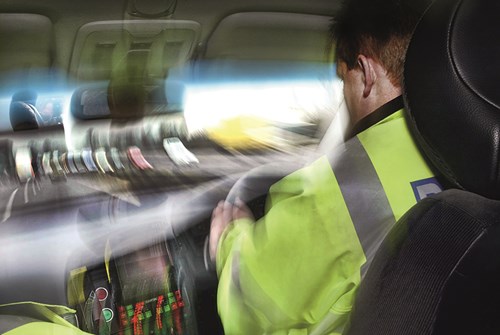'Let The Police Be Police'
15 September 2023

Police drivers should not be put off from pursuing criminals because of the risk of an “imbalance” that can lead to them facing lengthy investigations after some cases, Surrey Police Federation has said.
Chair Darren Pemble was speaking after comments by Sir Mark Rowley this week, who said that police drivers are still far too at risk of being investigated despite a change in the law to take into account their advanced training.
The Met Commissioner told delegates at the Superintendents’ Association conference that he believed police officers are treated differently to members of the public when deciding whether to charge them with criminal offences.
And Darren said: “I echo Sir Mark Rowley’s comments which highlight the imbalance as it stands. If we want police to police, we need to support our officers.
“At the moment, we have officers who are rightly concerned that when they do their job and chase criminals and arrest offenders that they may be subject to an investigation which puts them in the dock.
“We are not asking for police officers to be given a free pass regarding their actions and behaviour, what we want is a fair and transparent process that doesn’t take many months or years to resolve and remove good officers from the frontline.”
Sir Mark said “dispiriting and unfair” oversight of officers made them more hesitant when doing their jobs and was undermining their ability to confront dangerous criminals.
He said prosecutors and the Independent Office for Police Conduct (IOPC) were too eager to take action against officers accused of dangerous driving when pursuing suspects, and he urged them to allow the police to get on with the job of policing.
He added that if a suspect being followed by police crashed it would be the officers themselves who would end up being investigated and effectively held to account for someone else’s actions.
Sir Mark said: “I think you would be hard pushed to find anywhere else in the world where police officers get investigated for safely pursuing criminals. Why should it happen in Britain? Why should we discourage officers from pursuing offenders?”
He went on: “The IOPC and CPS in my view fail to follow the same charging standards for police officers that they do for the wider public, dragging innocent officers through years of stress.”
Sir Mark said around 80% of people charged by the CPS were ultimately convicted, but when police officers were charged with dangerous driving less than a third were found guilty.
“It seems to me they apply a different threshold for officers,” he explained.
Last year, a police officer was cleared over the deaths of two people killed when a car he was pursuing that was being driven by a teenage drug addict crashed in Penge, south London.
PC Edward Welch went on trial at the Old Bailey over the 2016 tragedy, but the jury cleared him of two charges of causing death by dangerous driving after just half a day of deliberations.
Sir Mark said it was vital police officers confronting dangerous criminals were able to do so with confidence, not fearing that they would be charged with a criminal offence afterwards.
He went on: “We need to empower and enable the tens of thousands of great officers with an oversight system that in future needs to act much more clearly without fear or favour not getting blown around on winds of opinion so that officers know they will have the right support if they are taking on dangerous people on behalf of the public.
“Dispiriting and unfair oversight creates hesitancy in their minds and that undermines our ability to confront dangerous criminals.”
The commissioner also criticised the amount of bureaucracy involved in policing, pointing out that it now took five times as much work to take a case to court as it did 20 years ago.
He said the complex legal duties of disclosure and redaction were now the responsibility of frontline officers, whereas in other countries this was done by prosecutors.
Sir Mark said: “It’s no surprise that if you make a system more costly and bureaucratic it will achieve less. That is why we have fewer cases solved and successfully prosecuted than we did in past decades.
“Criminal justice reform is overdue and the effect of that will be to let the police, police.”

















